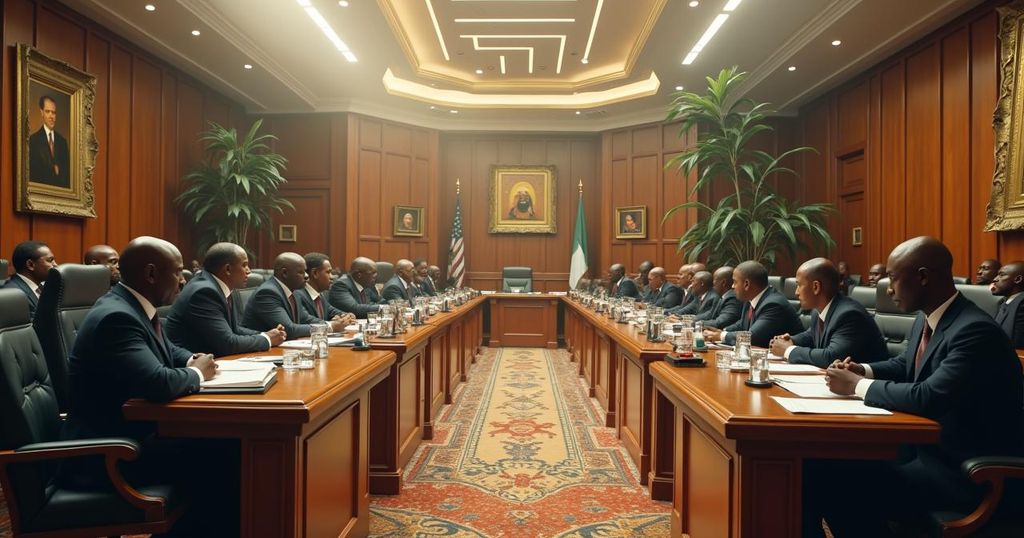South Sudan is making efforts to create a Hybrid Court to address war crimes from the ongoing civil conflict. Recent legislative advancements, although promising, face significant political resistance, with many leaders still opposed to transitional justice initiatives. The implications of such a court on national healing and accountability remain contentious.
After nearly a decade of delay, South Sudan is poised to establish a Hybrid Court aimed at addressing war crimes and crimes against humanity arising from the civil conflict that erupted in December 2013. The Transitional National Legislative Assembly has recently approved two significant bills—the Commission for Truth, Reconciliation and Healing Bill 2024 and the Compensation and Reparation Authority Bill 2024—which lay the groundwork for the Court’s formation. This initiative is a critical development in South Sudan’s ongoing quest for transitional justice, marking a pivotal step in the implementation of Chapter 5 of the Revitalised Agreement on the Resolution of the Conflict in the Republic of South Sudan (R-ARCSS). However, despite backing from key international donors, including the Troika nations (the United States, the United Kingdom, and Norway), political leaders in South Sudan have historically resisted the notion of transitional justice, fearing it may reignite past traumas. The R-ARCSS, a peace accord brokered by the Intergovernmental Authority on Development (IGAD) in 2018, included provisions for justice and reconciliation. Yet, disagreements among signatories have complicated advancements in these areas, particularly within the coalition government formed thereafter. According to Bona Deng Lawrence, chairperson of the Standing Specialised Committee on Peace and Reconciliation, the objectives of the two recent bills are to tackle the lingering issues from the conflict, ensure that victims receive justice and reparations, and establish psychotherapy and support centers for individuals affected by the violence. Since the onset of civil war, fueled by a power struggle between President Salva Kiir and his former deputy Riek Machar, both parties have faced serious allegations of war crimes. Deputy Chair of the Information Committee, Natelina Amjima Malek, highlighted the importance of these bills in facilitating the restoration of destroyed infrastructure and providing compensation to families affected by the violence of 2013 and 2016. Nevertheless, skepticism remains regarding the political will necessary for the successful implementation of the Hybrid Court, considering the government’s previous reluctance. Civil rights activist Edmund Yakani has voiced concerns, stating, “The leaders are anti-Hybrid Court. There is also the challenge of how the commission for truth, healing, and national reconciliation and the compensation and reparation process will work in the face of hostility from the political leadership.” In a joint opinion piece published in the New York Times in June 2016, President Kiir and Dr. Machar advocated against the court, suggesting that it would hinder national healing efforts. Ezekiel Lol Gatkuoth, a former minister, further contended, “There is no proven evidence in any court of law the Leadership are guilty of war crimes. The war crimes are political tools of the West to blackmail Africa.” The ongoing conflict has claimed over 400,000 lives, with millions displaced either internally or as refugees in several adjacent nations. Observers like Akol Miyen Kuol have expressed concerns regarding the feasibility of achieving the intended objectives of the Hybrid Court in the current fragile context. He posits that addressing the issues of war crimes might be more effectively approached through traditional reconciliation mechanisms rather than judicial processes stating, “I think it is too early for South Sudan to resort to a Hybrid Court to address the war crimes issue. Applying such a mechanism in South Sudan now could exacerbate the already delicate situation.”
The establishment of a Hybrid Court in South Sudan arises from prolonged conflicts and systemic injustices following the civil war initiated in late 2013. The objective is to seek accountability for war crimes and promote national reconciliation. The R-ARCSS peace agreement highlighted the significance of transitional justice as part of rebuilding the nation, yet the political landscape has been marked by resistance from leadership wary of revisiting past grievances. The recent passage of legislative measures marks a renewed attempt at enacting these principles, against a backdrop of skepticism regarding their practical execution and political endorsement.
In summary, South Sudan is making strides towards establishing a Hybrid Court designed to address atrocities committed during its civil war. While legislative actions reflect a commitment to justice and reconciliation, underlying political resistance and public skepticism pose significant challenges to actual implementation. The court’s success in providing justice and healing remains uncertain, as many continue to advocate for alternative reconciliation mechanisms suited to the region’s unique context.
Original Source: www.theeastafrican.co.ke






